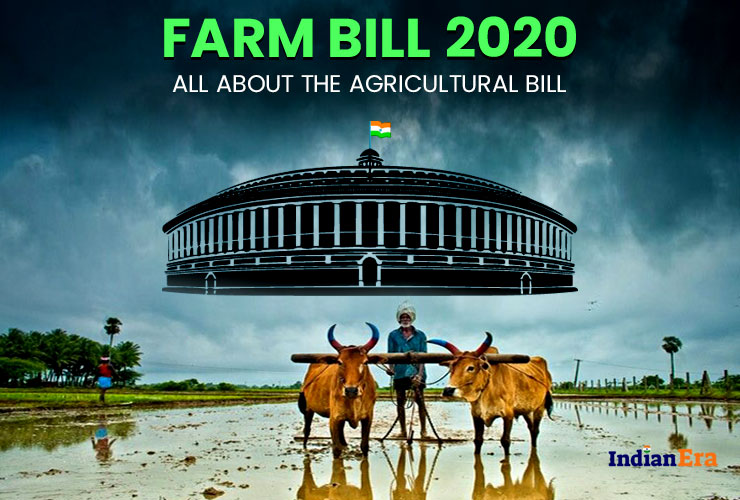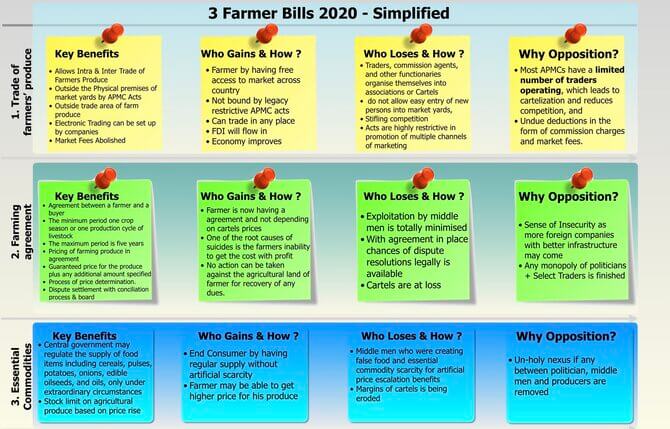If you have followed the recent breaking news and social media trends, you might have already heard of the three Farm Bills, a set of agricultural reforms passed by the Government of India (GoI) in September 2020.
Though the bills aim to transform the agriculture sector and raise farmers’ income, they are facing a massive backlash from opposition parties and farmers’ groups across the country, especially in Haryana and Punjab.
Farmers have taken to the streets, protesting against the three agriculture reforms- Farmers’ Produce Trade and Commerce Act 2020, Farmers Agreement on Price Assurance and Farm Services Act 2020, and the Essential Commodities (Amendment) Act 2020.
The farmers’ unions also called for ‘Bharat Bandh’ on December 8th, criticizing that the reforms could corporatize agriculture, threaten the current mandi network and dismantle the Minimum Support Price (MSP) system.

But very few of us know exactly why these new Farm Bills were introduced and why farmers are staging protests. Here’s a primer or an explainer on the contentious Farm Bills.
What is Farmers Bill / Farm Bill 2020?
The Farm Bill / Farmers Bill 2020 is a combination of three bills enacted by the Modi Government with an aim to introduce reforms in the agricultural sector.
The three bills are:
- Farmers’ Produce Trade and Commerce (Promotion and Facilitation) Bill, 2020
- Farmers’ (Empowerment and Protection) Agreement of Price Assurance and Farm Services Bill, 2020
- Essential Commodities (Amendment) Bill, 2020
Salient Features and Highlights of Farmer Bill 2020
Let’s dig deeper!
Farm Bill 1: The Farmers’ Produce Trade and Commerce (Promotion and Facilitation) Bill, 2020
As per the Agricultural Produce Market Committee (APMC) Act, the farmers in India are restricted to sell their agricultural produce only to the state-owned ‘Mandis.‘ Commission Agents (CAs) mediate between the farmers and traders to process the sales.
Farmers are not allowed to sell the produce outside the mandis. Even the trade of agricultural produce between various states is restricted.
The new law gives the farmers and traders the freedom of choice of sale and purchase of agricultural produce. It also promotes barrier-free trade of agri-produce outside the physical premises of mandis.
Basically, the reform aims at creating additional trading opportunities outside mandis to help farmers get remunerative prices due to additional competition.
Other benefits of the bill:
- Opens more choices of sale, improves competition among buyers, and helps farmers get better prices
- Farmers will not be charged any cess for sale of their produce outside mandis
- No marketing/transportation costs
- Electronic trading in transaction platform to be established for ensuring a seamless trade
- Farmers can sell their produce at mandis, farmgate, cold storage, warehouse, processing units, among others
- Farmers of regions with surplus produce will get better prices
- Consumers of regions with shortages will get lower prices
- Paves the way for One India, One Agriculture Market
Why are farmers protesting then?
- The downside to this law is that it leads to the entry of private corporates who may dictate terms over time and exploit farmers
- Minimum Support Price (MSP) system will get dismantled
- Tax-free private trading will make the APMC mandis unviable, leading to a reduction in government procurement
- The eventual redundancy of the APMC mandis leaves the farmers at the mercy of the corporate players
- The future of government electronic trading portal like e-NAM is uncertain
Govt. Clarification:
- Procurement at the MSP rate will continue; the MSP for Rabi season will be announced soon
- Mandis will continue operating as before. Under the new law, farmers will have the option to sell their produce outside mandis
- The e-NAM trading system will be used in the mandis as before
- Electronic platforms will increase transparency, saves time, and increases trade in farm produce
Farm Bill 2: The Farmers (Empowerment and Protection) Agreement of Price Assurance and Farm Services Bill, 2020
Small and marginal farmers who operate with just a few acres of land make up over 80 percent of the agrarian population. They lack the mechanization and efficiencies of scale common in developed economies.
Moreover, the Indian agricultural sector has specific inevitable weaknesses such as weather dependence, production uncertainties, and market unpredictability. All these make agriculture risky and inefficient.
The new law aims to empower farmers to engage with agribusiness firms, processors, wholesalers, aggregators, large retailers, and exporters, with an agreement of price assurance even before sowing crops.
This will transfer the market unpredictability risk from the farmer to the private corporations or sponsors.
Other benefits of the bill:
- Due to prior price agreement, farmers will be protected from market price disruptions
- Helps farmers to get access to modern technology, better seeds, and other farm inputs
- The law reduces the marketing cost and improves farmers’ income
- It boosts the private sector investment, research, and new technology in the agriculture sector
- Farmers can enjoy full realization of price by engaging in direct marketing
- The law prohibits sale, lease, or mortgage of farmers’ land and protects it against any recovery
- The reform features an effective dispute resolution mechanism with clear timelines for redressal
Why are farmers protesting then?
- Corporatization of agriculture with no mechanism of fixing a price results in exploitation of farmers
- Without a security net in the form of an assured payment guarantee, the huge corporations can exploit the farmers through unbalanced contracts
- Under contract farming, small and marginal farmers will unlikely match the corporate sponsors in bargaining power
- The small farmers will not be able to practice contract farming as the corporate players will shy away from them
- In case of any disputes, the big corporations will have the advantage owing to their monopolistic power and political backing
Govt. Clarification:
- Under contract farming, the farmer will have the absolute power to fix the price for the produce. The payment will be credited to the farmers within a maximum of 3 days
- The Central Government is establishing around 10,000 Farmer Producer organizations (FPOs) across the country, which will bring together small farmers and ensure remunerative pricing for their produce
- Under contract farming, the sponsor will pick up the produce directly from the farm. Farmers will not have to seek out traders
- There will be a local dispute redressal mechanism, eliminating the need to visit courts in case of dispute
Farm Bill 3: Essential Commodities (Amendment) Bill, 2020
The Essential Commodities Act, 1995 gives the government power to regulate the production, supply, and distribution of essential commodities and impose a stock limit to prevent hoarding and black marketing. While the Act’s purpose was initially to check illegal trade practices, lately, it has become a hurdle for investment in cold storage, warehouses, processing, and export.
The Act has dampened the entrepreneurial spirit to invest in cold chains and storage facilities for many essential commodities, especially perishable goods, as they could attract sudden stock limits. The Essential Commodities (Amendment) Bill, 2020 seeks to address such concerns.
The new Essential Commodities Amendment Bill removes commodities like pulses, cereals, potatoes, onions, edible oils, and oilseeds from the list of essential commodities. Therefore, these commodities are free of ECA restrictions.
However, the amendment gives the government the right to regulate such commodities in extraordinary situations such as war, famine, steep price rise, and natural calamity. The imposition of stock limits will be based on the price trigger.
Other benefits of the amendment:
- Frees private investors from the fear of excessive regulatory interference
- The freedom to produce, store, move, distribute and supply will help harness economies of scale
- Boosts private sector or foreign direct investments in the agriculture sector, particularly in post-harvesting activities such as cold storage, warehouses, processing, and export
- Processors and value chain participants are excused from the stock limit
- Creates a competitive market environment
- Modernizes food supply chain
- Prevents wastage of agri-produce by driving up investments in cold storage facilities
Why are farmers protesting then?
- The amendment will lead to increased hoarding and an artificial price rise of the relieved commodities by corporate players, supermarket chains, or any other retailers
- The price triggers envisioned in the amendment are unrealistic and are so high that they will hardly ever be invoked
- It may adversely impact the public distribution system
Clarification:
- The amendment helps achieve the target of doubling farmers’ income
- The ECA was enacted when the country was not self-sufficient in food production. But now the situation has changed, escalating the need for amendment
- Interests of consumers are protected while liberalizing the regulatory environment
How Farm Bill 2020 Benefits Farmers, Agritech Startups, Private Players?
As per Modi’s government, the new Farm Bills aim to benefit marginal farmers, who make up 80 percent of Indian agriculture.
Agritech startups, agri warehouses, and private players in the food trade are some other prominent beneficiaries.
| Benefits of New Farm Bills in a Nutshell | ||
| Farmers | Agritech Startups | Private Players |
| Freedom of choice of sale | Direct procurement from farmers | Contract farming opportunities |
| Barrier-free intra-state and inter-state trade | No intermediaries or mediators | Direct interaction with farmers |
| Trade outside mandis | No licensing risks at APMCs | First access to agri produce |
| Reduced marketing costs and improved income | Connecting agribusiness to farmgate | Access to select agri commodities |
| Better price for produce | Investing in agri warehousing and cold storage facilities | Investments in processing and grading of produce |
| Reduction in post-harvest loss and wastage | Demand for agri trading and marketplaces | Enhanced tech-enabled logistics and supply chains |
| No cess for sale | Opportunities for agri contracts, farm advisory and consulting | Building state-of-art cold storage facilities |
| Price assurance before sowing | Long-term agreements with farmers | Options to design farmer-first programs |
| Direct marketing | – | – |
| Improved market linkages and supply chain | – | – |
States opposing the Farmers Bill 2020
Several farmer unions and opposition political parties across India began holding protests soon after the Central Government enacted the three farm bills. After two months of protests, they started a movement called ‘Dilli Chalo,’ in which tens of thousands of farmers marched towards the Indian capital.

Their campaign has found resonance on social media and won tremendous public sympathy across the world.
Here are the states that witnessed severe protests:
- Punjab
- Haryana
- Uttarakhand
- Utter Pradesh
- Rajasthan
- Gujarat
- Jharkhand
- Madya Pradesh
- Odisha
- Karnataka
- Goa
- Tamil Nadu
- Telangana
Closing Thoughts
One of the major concerns that led to the uproar throughout the country is the unconstitutional way the bills were enacted.
The Centre has by-passed the federal structure by legislating on subjects that exclusively fall within the state government’s domain.
The Modi Government should have included the opposition parties and considered farmers’ voices to address the loopholes in the bills.
The Centre has not only passed the bills quickly without referral to a parliamentary panel, but they did so when the country is reeling under the pandemic, with most people busy with personal issues. This has triggered an air of mistrust between the ruling, opposition, and the farmers.

So far, PM Narendra Modi and his government have taken a stance against the protests, claiming that the new bills will provide farmers more autonomy, enable better marketing, and remove regulatory hurdles.
To some extent, the Centre has a point. For decades, economists have stressed the need for reforms in India’s obsolete agriculture sector, where intermediaries control prices, stagnate supply chains, and contribute to food wastage. And small farmers, who make up most of the agrarian population, cannot afford the mechanization and efficiencies of scale common.
However, Narendra Modi has pulled off another big, bold decision with little emphasis on democratic decision-making.
In 2016, he declared sudden demonetization of INR 500 and INR 1,000 banknotes, creating significant disruption throughout the economy. Last year, the revocation of Kashmir’s special status caught the country by surprise. And in July 2020, Modi’s government approved the National Education Policy 2020 (NEP 2020), which looks promising only through a birds-eye view. However, none of these contentious decisions ended up harming Modi’s reputation.
Will the ongoing farmers’ protests present a severe challenge to Modi? It’s hard to say.
What is your opinion on Farm Bill 2020? Please share with us!
More Special Articles:
- National Education Policy (NEP) 2020
- Cashless Economy in India
- Profitable Business Ideas in India
- Nepotism in India








